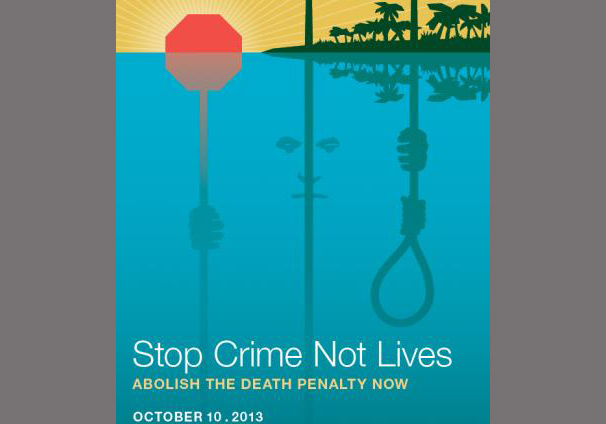
Serious setback: Singapore breaks moratorium on death penalty
The ICJ condemns the execution of Tan Hai Liang and Foong Chee Peng in Singapore today. By executing the two men, Singapore breaks the moratorium it has respected since 2011.

The ICJ condemns the execution of Tan Hai Liang and Foong Chee Peng in Singapore today. By executing the two men, Singapore breaks the moratorium it has respected since 2011.

The ICJ strongly condemns two rulings by the Minya Criminal Court issued today. In the first ruling, the court convicted and sentenced to death 683 individuals.

The ICJ calls on the Government of Malaysia to stop the execution of death row prisoner Chandran, apparently scheduled to take place on Friday 7 February.
Chandran was convicted for murder and sentenced to death on 16 April 2008.
While the Government of Malaysia has not publicly released the date, according to the Malaysian Bar Council, his execution is planned to take place on 7 February 2014.
Despite the prohibition of mandatory death sentences under international human rights law, the laws in Malaysia maintain the mandatory death sentence for offences such as murder, treason and drug trafficking.
The Malaysian Bar Council, a partner organization of the ICJ, has noted that there have been several instances in the past when the Government of Malaysia indicated that it would review the mandatory death penalty, with a view to its possible abolition or the possible reintroduction of a discretionary death penalty. It has also indicated its intention of reviewing the penalty of death for drug-related offenses.
“Considering prohibition of the mandatory death penalty in international human rights law and the past indications made by the Government of Malaysia that it intends to review the imposition of mandatory death penalty, it is deeply concerning that it still aims to proceed with the execution of Chandran on Friday,” said Sam Zarifi, ICJ Regional Director for Asia and the Pacific.
In October 2013, Malaysia underwent their second Universal Periodic Review where it was urged by several countries to review the mandatory nature of death penalty, maintain a moratorium, and ultimately move to abolish the death penalty.
Malaysia is set to respond to these recommendations in March 2014.
The Malaysian Bar Council estimates that there are approximately 900 prisoners in death row in Malaysia awaiting execution.
The ICJ considers that the use of the death penalty constitutes a violation of the right to life and the right not to be subjected to cruel, inhuman or degrading punishment.
In addition to calling a halt to the execution of Chandran, the ICJ urges the Government of Malaysia to amend its laws and take steps towards the abolition of the death penalty in the country, including the implementation of a moratorium.
Contact:
Emerlynne Gil, ICJ International Legal Adviser for Southeast Asia, t +66 2 619 8477; email: emerlynne.gil(a)icj.org
Craig Knowles, ICJ Media Consultant, t +66 81 9077653; email: craig.knowles(a)icj.org

On the 11th World Day against the Death Penalty, the ICJ calls on South Asian States to stop the resurgence of executions in the region.
The ICJ considers the death penalty in all cases to constitute a violation of the right to life and the right not to be subjected to cruel, inhuman or degrading punishment.
“In the past year, we’ve seen an alarming increase in the number of executions in South Asia,” said Sheila Varadan, International Legal Advisor for the South Asia Programme.
“Capital punishment is State-sanctioned vengeance. The deliberate and premeditated act of taking a human life in State custody can never constitute a form of justice. It is is an irreversible form of punishment that, as we have seen time and again, cannot be administered without some degree of subjectivity and arbitrariness,” she added.
India ended its eight-year moratorium on the death penalty with the executions of Ajmal Amir Kasab in November 2012 and Afzal Guru in February 2013.
Although the current policy on a moratorium is unclear, Pakistan appears to be leaning towards resuming executions. In November 2012, Pakistan carried out its first execution in five years when it hanged solider Muhammad Hussain.
In July 2013, the newly-elected Government signaled its intention to recommence civilian executions after it failed to renew the five-year moratorium. Over 8000 people have been sentenced to death in Pakistan.
Bangladesh also continues to exercise the death penalty. It has over 1000 individuals on death row.
Bangladesh’s International Crimes Tribunal has handed down the death penalty in six of the seven cases completed, despite growing international criticism over the independence and impartiality of the proceedings.
South Asia’s increasing resort to the use of the death penalty goes against a 15-year worldwide trend towards abolition. More than 150 of 192 United Nations member States have now either abolished the death penalty or do not practice it, including 30 States from the Asia-Pacific region.
The United Nations General Assembly has adopted a number of resolutions calling for a worldwide abolition of the death penalty. In its most recent resolution in 2012, an overwhelming majority of UN member States voted in favor of a worldwide moratorium on executions as a step towards the abolition of the death penalty.
“India, Pakistan and Bangladesh are part of a dwindling number of States who still retain this cruel and inhumane form of punishment,” Varadan said.
The ICJ urges India, Pakistan, and Bangladesh to immediately impose a moratorium on the death penalty, with a view to abolishing it and accede to the Second Optional Protocol to the International Covenant on Civil and Political Rights on the abolition of the death penalty.
CONTACT:
Sheila Varadan, ICJ Legal Advisor, South Asia Programme, t: +66 857200723; email: sheila.varadan(a)icj.org
NOTE:

Por primera vez, un Juzgado de primera instancia, condenó al Estado guatemalteco por violaciones al derecho a la alimentación.
Está incluye la violación al derecho a la vida, a un nivel de vida adecuado, a la salud, a la educación y a la vivienda de niños y niñas del municipio de Camotán del departamento de Chiquimula al noroeste de este país.
El Estado de Guatemala fue declarado responsable de estas violaciones, por omisión, al no contemplar programas, políticas, acciones y medidas eficaces que evitaran problemas de salud en estos niños a causa de la desnutrición crónica sufrida por falta de una alimentación adecuada.
Las sentencias fueron emitidas entre abril y mayo de este año por el Juzgado de la Niñez y Adolescencia y de Adolescentes en conflicto con la Ley Penal del departamento de Zacapa.
Estas resoluciones obligan al Ministerio de Agricultura y Ganadería y Alimentación, al Ministerio de Salud y Asistencia Social, al Ministerio de Comunicaciones, Infraestructura y Vivienda, al Ministerio de Educación, al Ministerio de Trabajo y Previsión Social, al Ministerio de Desarrollo Social, a la Secretaria de Seguridad Alimentaria y Nutricional, al Consejo Nacional de Seguridad Alimentaria y Nutricional, al Fondo de Tierras, a la Secretaria de Asuntos Agrarios, a la Procuraduría General de la Nación, a la Procuraduría para los Derechos Humanos y a la Municipalidad de Chiquimula a que adopten una serie de medidas para restaurar los derechos violados.
A solicitud de la Campaña Guatemala sin Hambre y de los abogados litigantes Jaime Tecu y Lorena Ramírez, la oficina de la Comisión Internacional de Juristas en Centroamérica presentó en todos los casos un Amicus Curiae a fin de ilustrar al juzgador sobre los estándares internacionales relativos a la protección de niños/niñas y al derecho a la alimentación, así como las obligaciones jurídicas generales y específicas de los Estados en esta materia.
Además se abordó el acceso a la justicia, la exigibilidad legal del derecho a la alimentación, la función de la administración de justicia y la responsabilidad del Estado de Guatemala en materia del derecho a la alimentación.
La elaboración del Amicus Curiae contó con el apoyo del Programa de Derechos Económicos, Sociales y Culturales (DESC) de la CIJ.
Estas sentencias significan un avance para la justiciabilidad de los DESC y constituye un paso para lograr el acceso a la justicia de poblaciones vulnerables en Guatemala.
Además, representa un precedente para que otros casos sean judicializados y se logre que el Estado de Guatemala cumpla con sus obligaciones de respetar y proteger el derecho a la alimentación según los estándares internacionales de protección de derechos humanos.
En coordinación con la Campaña Guatemala sin Hambre y con los abogados antes mencionados se llevarán a cabo diferentes acciones para la ejecución de las sentencias.
Se adjunta a esta nota una copia de uno de los Amicus Curiae presentados por la CIJ, así como la última sentencia emitida en uno de los casos.
Guatemala-CIJ Amicus Derecho a la Alimentación-legal submissions-2013-spa (full text in pdf)
Guatemala-Resumen casos de los niños y niñas de Camotán-cases-2013-spa (full text in pdf)
Guatemala-Sentencia Caso Alimentacion Leonel Amador Garcia-cases-2013-spa (full text in pdf)
Guatemala-Sentencia Caso Alimentacion Mayra Amador Espino-cases-2013-spa (full text in pdf)
Guatemala-Sentencia Caso Alimentacion Dina Marilu y Malvelita Lucila-cases-2013-spa (full text in pdf)
Guatemala-Sentencia Caso Alimentacion Brayan Rene Espino Ramirez-cases-2013-spa (full text in pdf)